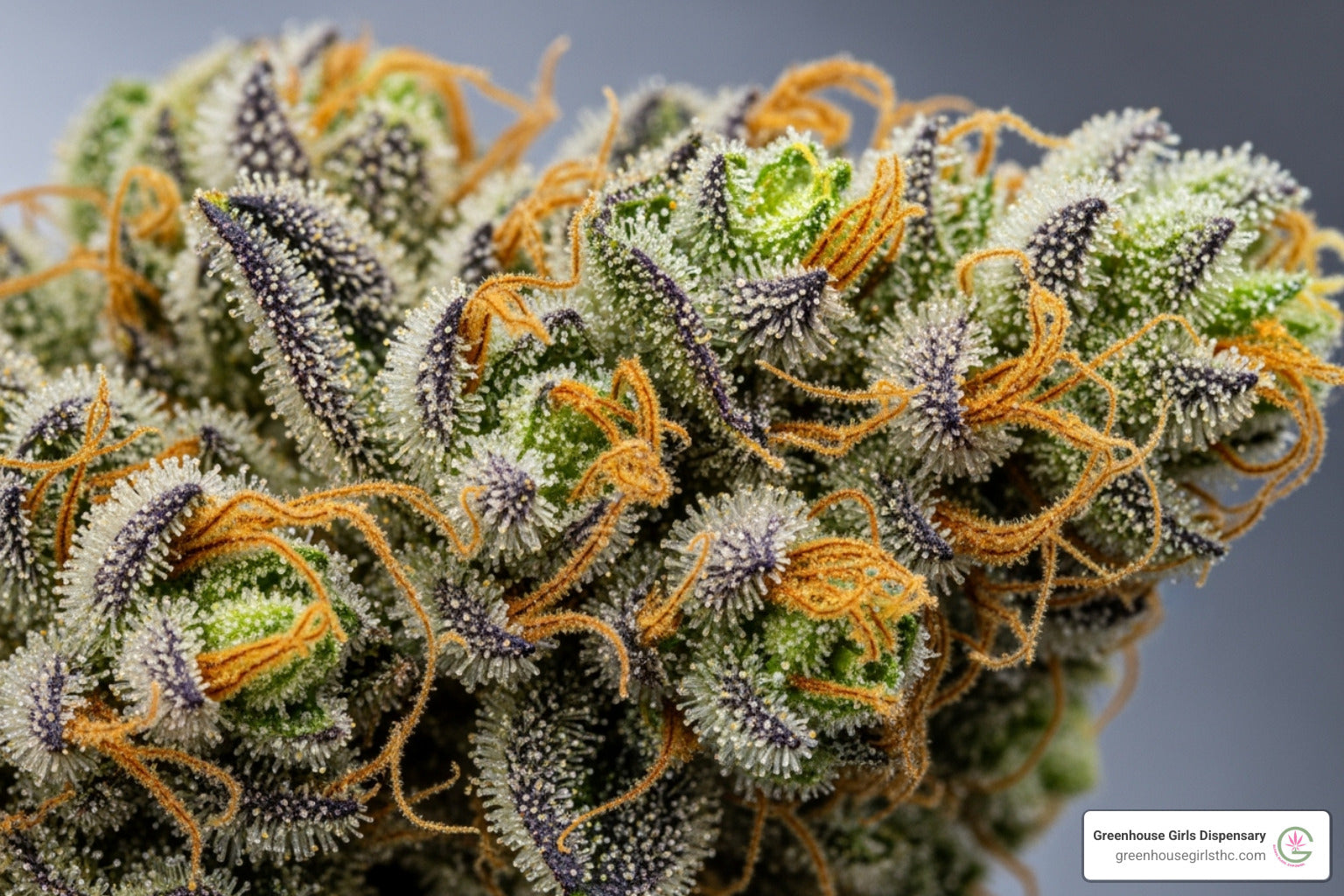
The THCa Lowdown: Navigating Legality and Ensuring Safe Use
Understanding the Complex Legal Landscape of THCa
THCa legal status remains one of the most confusing aspects of modern cannabis law. While this non-psychoactive cannabinoid exists in a federal gray area, state regulations vary wildly across the country.
Quick Answer: THCa Legal Status Overview
- Federal Level: Legal if derived from hemp with <0.3% Delta-9 THC (2018 Farm Bill)
- State Level: Varies significantly - some states allow it, others ban it completely
- Key Factor: THCa converts to psychoactive THC when heated
- Testing Method: Some states use "Total THC" calculations that include THCa
- Legal Risk: High variation between states creates compliance challenges
THCa (tetrahydrocannabinolic acid) is the raw, non-psychoactive precursor to THC found in fresh cannabis plants. Unlike THC, THCa won't get you high in its natural state. But here's where it gets tricky - when you heat THCa through smoking, vaping, or cooking, it converts into psychoactive THC through a process called decarboxylation.
This conversion creates a legal puzzle. The 2018 Farm Bill legalized hemp and its derivatives, including THCa, as long as the Delta-9 THC content stays below 0.3% by dry weight. However, many states have adopted "Total THC" calculations that include THCa in their measurements, potentially making high-THCa products illegal even if they're federally compliant.
The stakes are real. As one cannabis journalist finded while researching THCa, companies stopped responding to her emails when legality questions arose - highlighting just how uncertain this landscape remains.
I'm Selena Jochumsen, and through my work with Greenhouse Girls Dispensary and involvement with the Florida Smokes Association and National Cannabis Industry Association's Hemp Committee, I've steerd the complex THCa legal status challenges that both businesses and consumers face daily. Understanding these laws isn't just about compliance - it's about making informed choices that keep you safe and legal.
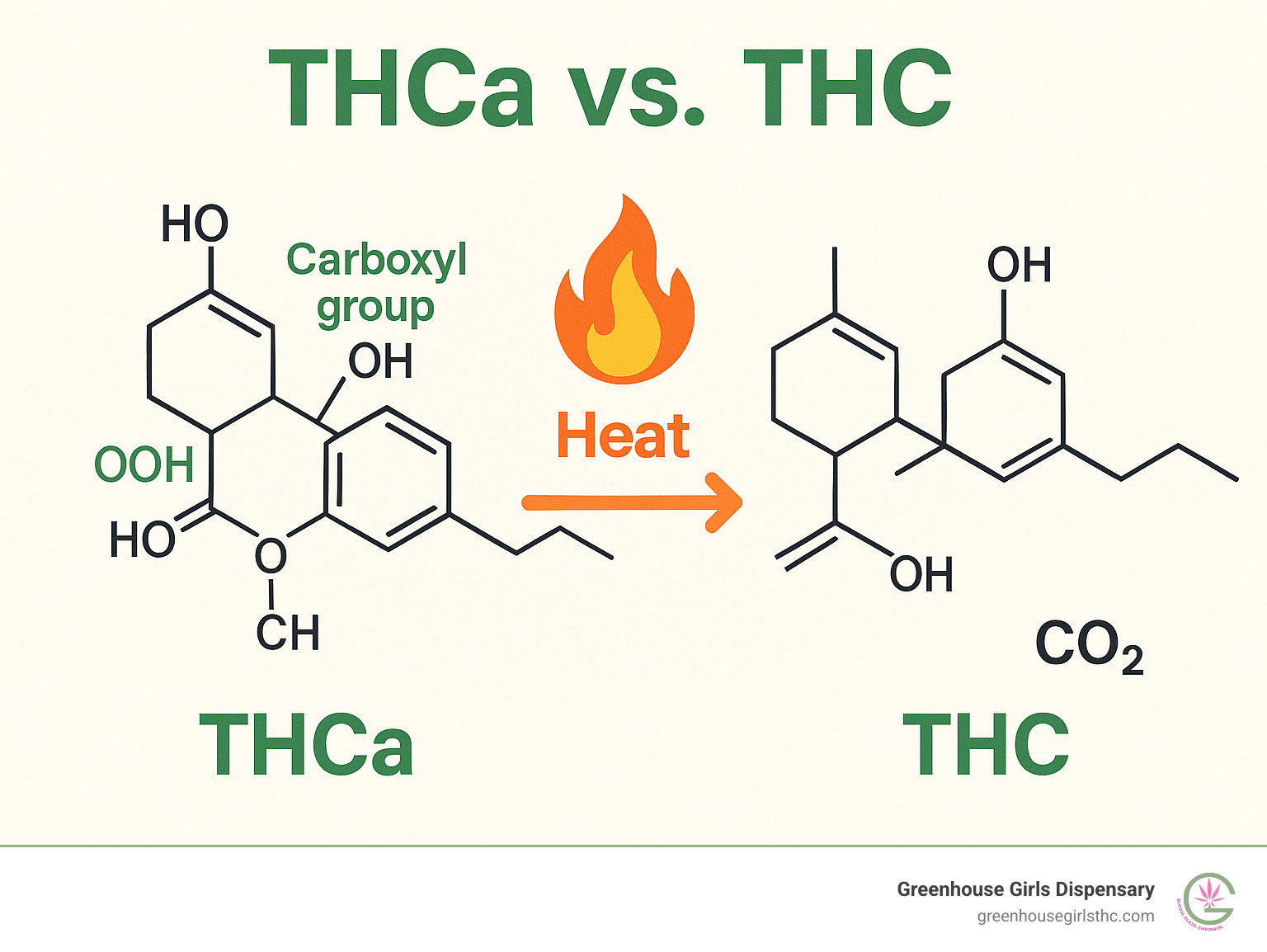
What is THCa and How Does it Differ from THC?
If you've ever wondered what makes cannabis tick before it gets you high, you're in for a treat. Meet THCa - the quiet, non-psychoactive cousin of THC that's been hiding in plain sight all along.
THCa, or tetrahydrocannabinolic acid, is what you'll find when you peek inside a fresh, raw cannabis plant. It's essentially THC's shy sibling that hasn't quite found its confidence yet. The key difference? THCa has an extra carboxyl group attached to its molecular structure, and that little addition makes all the difference in the world.
This extra chemical baggage means THCa can't bind effectively with your brain's CB1 receptors - the same receptors that THC loves to cozy up to. It's like trying to fit a square peg in a round hole. Scientific research shows us that THCa acts as a precursor to THC, meaning it's the raw ingredient waiting for its moment to transform.
What makes this particularly interesting for THCa legal status discussions is that this non-psychoactive compound exists in a completely different legal category than its activated cousin.
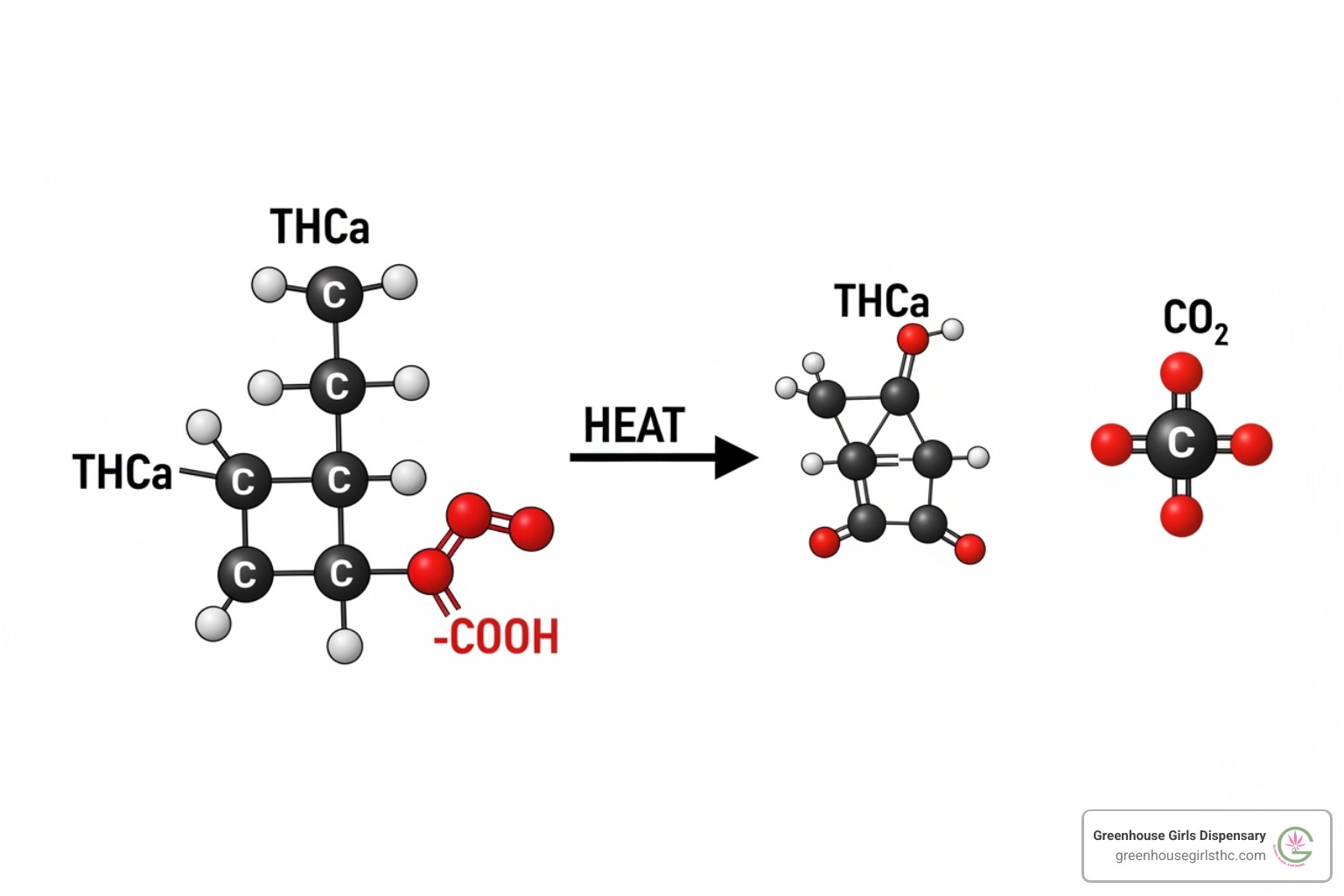
The Decarboxylation Effect
Here's where things get interesting. That sleepy THCa molecule can wake up and become psychoactive THC with just one simple ingredient: heat.
The process is called decarboxylation, and it happens every time you light up, vape, or bake with cannabis. When heat hits THCa, that extra carboxyl group breaks off and escapes as carbon dioxide, leaving behind the THC molecule we all know and love.
Think of it like popping popcorn - the heat transforms the kernel into something completely different. Smoking, vaping, and cooking all trigger this same chemical reaction. The temperature doesn't need to be extreme either; even the gentle heat from a vaporizer at 220°F will do the trick.
This change is why you can munch on raw cannabis leaves all day without getting high, but one puff of smoke changes everything. It's also why the legal landscape gets so complicated - lawmakers have to consider both what the plant contains naturally and what it could become with a little heat. Learn more about THCa flower and how this process affects different products.
Psychoactive Properties: THCa vs. THC
The difference between feeling nothing and feeling everything comes down to how these molecules interact with your endocannabinoid system. This internal network of receptors helps regulate everything from your mood to your appetite to how you process pain.
THC has a high binding affinity for CB1 receptors in your brain. When it locks into these receptors, it triggers that familiar euphoric feeling - the classic cannabis "high." It's like finding the perfect key for a lock.
THCa, with its bulky carboxyl group, has very low binding affinity for these same receptors. It simply doesn't fit properly, so it can't trigger the same psychoactive response. This means you get to explore THCa's potential therapeutic benefits without any intoxicating effects.
It's actually pretty remarkable when you think about it. The same plant can offer completely different experiences depending on whether you consume it raw or apply some heat. This unique property makes THCa particularly appealing for people who want to explore cannabis therapeutically without intoxication - and it's one reason why the legal status of THCa products continues to evolve across different states.
Understanding the Federal and State THCa Legal Status
Here's where things get really interesting – and honestly, a bit frustrating. The THCa legal status landscape is like a jigsaw puzzle where half the pieces keep changing shape. You've got federal laws saying one thing, state laws saying something completely different, and everyone trying to figure out what's actually legal.
The heart of this confusion comes down to how we define cannabis. Is it "hemp" or "marijuana"? The answer depends entirely on one number: the Delta-9 THC concentration. This single measurement has created a legal maze that even lawyers sometimes struggle to steer.
The Federal Stance: The 2018 Farm Bill
Let's start with the good news. The 2018 Agriculture Improvement Act – better known as the 2018 Farm Bill – changed everything for cannabis in America. This landmark legislation basically said, "Hey, if your cannabis plant has less than 0.3% Delta-9 THC by dry weight, it's not marijuana anymore – it's hemp, and hemp is legal."
This was huge for THCa. Since THCa isn't Delta-9 THC (remember, it's the precursor that needs heat to convert), high-THCa hemp flower can be perfectly legal under federal law. As long as that Delta-9 THC stays below 0.3% before you light it up, you're in the clear federally speaking.
Think of it as a legal loophole, but one that's completely intentional. The DEA has even clarified that hemp meeting this criteria isn't a controlled substance. You can check out the official text of the 2018 Farm Bill if you're into reading government documents (no judgment if you're not).
This federal framework is what allows companies like us at Greenhouse Girls to ship lab-tested THCa flower nationwide from our Palm Harbor location. We're working within that federal hemp definition, sourcing from small family farms that grow compliant hemp.
The "Total THC" Complication in State Laws
Now here's where states decided to throw a wrench in the works. While the federal government focuses on Delta-9 THC, many states looked at THCa and thought, "Wait a minute – this stuff turns into THC when you heat it. Shouldn't we count that too?"
So they created something called "Total THC" calculations. The formula looks like this: (THCa × 0.877) + Delta-9 THC. That 0.877 number accounts for the molecular weight lost when THCa converts to THC during decarboxylation.
States like Oregon, Minnesota, and Arkansas have adopted this stricter approach. If your product's "Total THC" exceeds 0.3%, these states classify it as illegal marijuana – even if the actual Delta-9 THC content was federally compliant.
This creates some pretty wild situations. A THCa flower that's perfectly legal to ship from Florida might be considered illegal the moment it crosses into Oregon. We've seen how these regulatory differences play out in real time, especially with the evolving THC regulations in Florida and Texas.
It's like having a driver's license that's valid in most states but gets you arrested in others. The THCa legal status becomes a moving target depending on where you are.
State-by-State THCa Legality
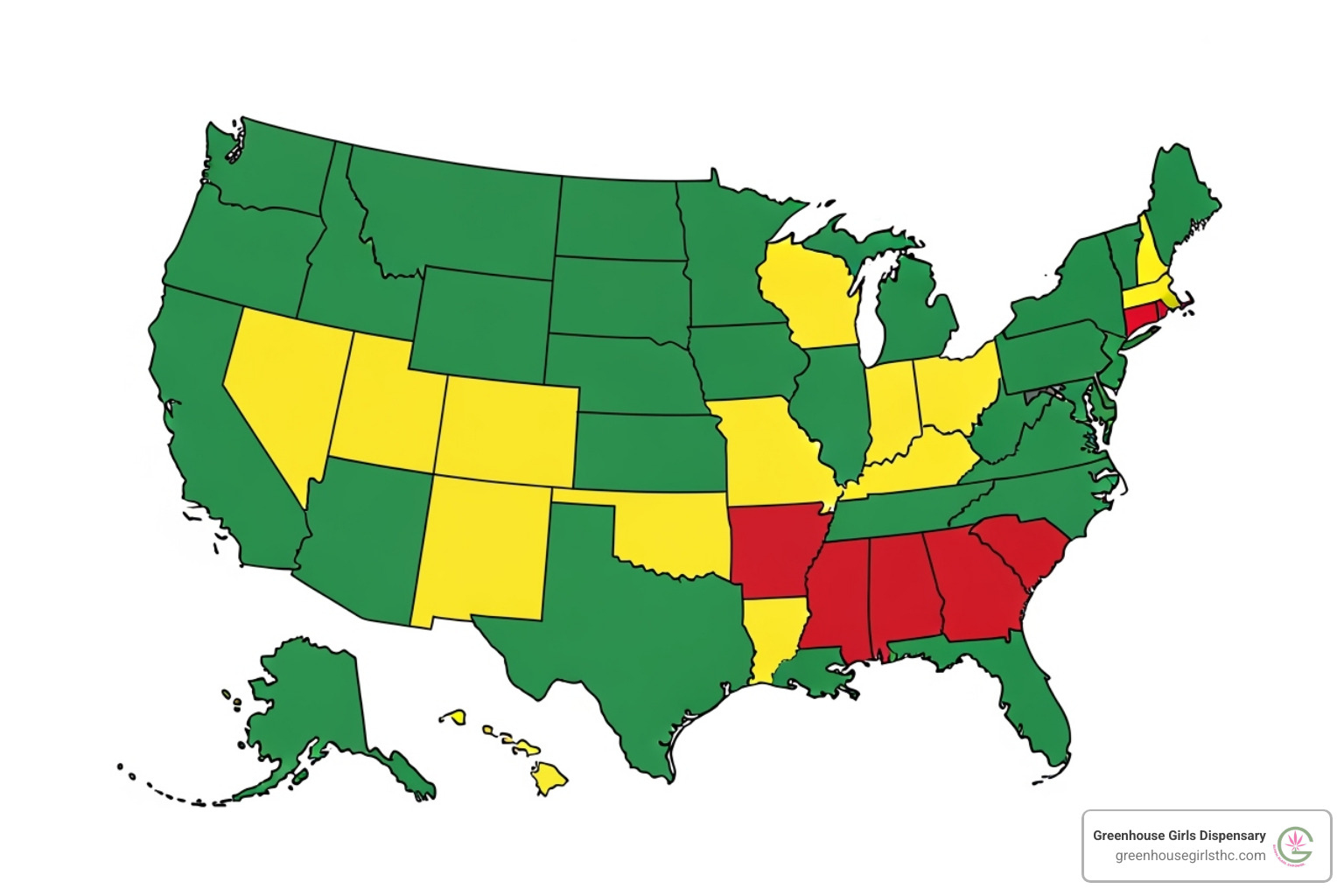
Important note: This information is for educational purposes only and isn't legal advice. Laws change faster than fashion trends, so always check your local and state websites for current regulations.
The good news is that most states follow the federal guidelines. Legal states like Florida, Texas, North Carolina, Alabama, Georgia, Kentucky, and many others stick to the 0.3% Delta-9 THC rule. In these states, hemp-derived THCa products are generally legal as long as they meet federal compliance standards.
Colorado, California, Michigan, New York, and other recreational marijuana states typically allow THCa under their broader cannabis laws, plus hemp-derived products that meet federal standards.
Then you have the gray area states – places like Rhode Island that might have legal recreational marijuana but still restrict certain hemp-derived products, or states that use the "Total THC" calculations we talked about.
Finally, there are the stricter states like Idaho and South Dakota where THCa faces significant restrictions. Iowa and some others have adopted "Total THC" rules that effectively ban most high-THCa products.
Minnesota presents an interesting case – they've legalized recreational marijuana but still ban hemp-derived THCa products that exceed their "Total THC" limits. Arkansas and Oregon have similar approaches, creating situations where legal marijuana might be easier to access than legal hemp.
The reality is that THCa legal status varies dramatically depending on your zip code. What's completely legal in one state might land you in hot water fifty miles down the road. This patchwork of regulations makes it crucial to understand your local laws before purchasing or possessing any THCa products.
That's why at Greenhouse Girls, we always recommend checking your state and local regulations before placing an order. We can ship federally compliant products nationwide, but we want our customers to be informed about their local legal landscape. After all, staying legal and safe is just as important as enjoying high-quality, lab-tested cannabis products.
Potential Benefits, Risks, and Available Forms
When it comes to THCa products, knowledge truly is power. Understanding what you're putting into your body - from potential therapeutic benefits to safety considerations - helps you make choices that align with your wellness goals and keep you on the right side of THCa legal status regulations.
The world of THCa offers exciting possibilities, but like any emerging market, it comes with both opportunities and challenges worth exploring.
Potential Benefits of Raw THCa
Here's where THCa gets really interesting. While it won't give you the psychoactive effects of THC, research suggests that raw THCa might offer some pretty impressive therapeutic potential. Think of it as getting the wellness benefits without the "high."
Scientists are actively studying THCa's anti-inflammatory properties, and early findings suggest it may help reduce inflammation throughout your body. This could be particularly valuable for people dealing with chronic inflammatory conditions.
The neuroprotective effects are equally fascinating. Research on THCA's neuroprotective activity indicates it might help protect your brain cells and support overall neurological health. While we're still in the early stages of understanding these benefits, the preliminary results are encouraging.
Many people also turn to raw THCa for its anti-nausea properties. Some users report that it helps reduce nausea and vomiting without any intoxicating effects. Others find it naturally stimulates their appetite, which can be helpful for various health conditions.
Important note: This research is still developing, and we're not making medical claims here. Always consult with a healthcare professional before using any cannabis product for medical purposes.
Risks and How to Stay Safe
Let's be honest - the hemp-derived cannabinoid market is a bit like the Wild West right now. The lack of comprehensive federal oversight means you might encounter products that are mislabeled, contaminated, or just plain inaccurate about their cannabinoid content.
We've seen the real-world consequences of this regulatory gap. The quiet cannabis crackdown in Florida led to several hemp dispensaries closing their doors, highlighting how quickly THCa legal status can shift when products don't meet compliance standards.
Your best defense? Third-party lab reports, also known as Certificates of Analysis (COAs). These documents are your roadmap to product safety. They verify cannabinoid content, confirm Delta-9 THC levels stay below 0.3%, and check for nasty contaminants like pesticides, heavy metals, and mold. If a company can't provide a COA, that's your cue to shop elsewhere.
Verifying compliance is equally crucial. Check that COA to ensure the product meets not just federal standards, but any stricter state-level "Total THC" regulations in your area. And always source from reputable vendors who prioritize transparency and quality.
At Greenhouse Girls, we take this responsibility seriously. All our products are federally legal, lab-tested, and sourced from small family farms. We believe you deserve to know exactly what you're getting - clean, high-quality hemp-derived cannabis products you can trust.
Common Forms of THCa Products
The beauty of THCa lies in its versatility. Whether you want to experience its raw benefits or convert it to THC through heating, there's likely a product form that fits your lifestyle perfectly.
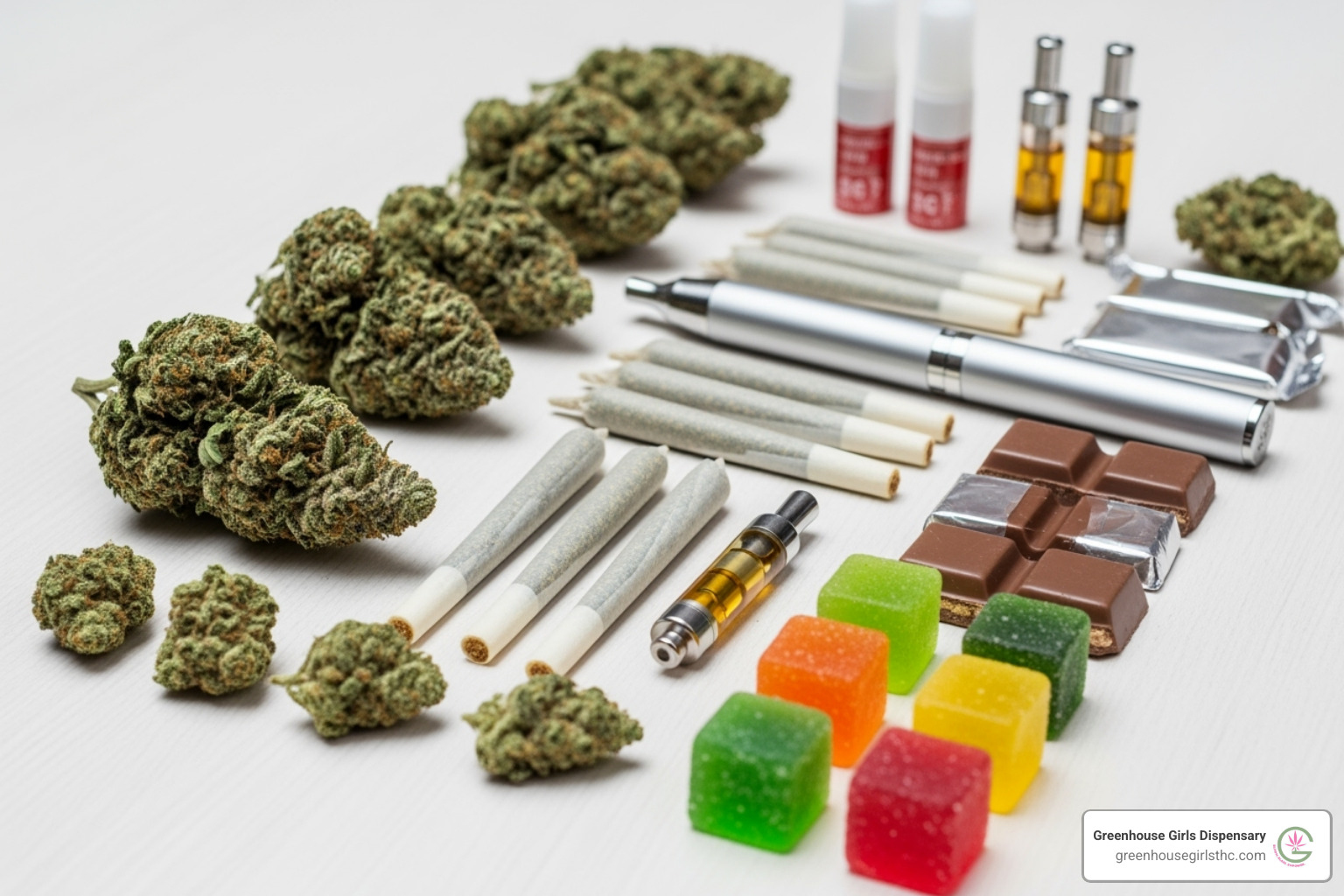
THCa flower is probably the most straightforward option. It looks, smells, and feels just like traditional cannabis, but won't be psychoactive until you heat it. Our flower offerings, especially our shake deals, have become incredibly popular with customers who want quality at a great value.
Prerolls offer the ultimate convenience - ready-to-use joints made with THCa flower. Perfect for when you want to skip the prep work and dive right into your experience. These have become one of our top-selling services for good reason.
Vapes containing THCa distillate or live resin offer instant effects. The moment you vaporize THCa, it converts to THC, delivering fast-acting results that many users prefer for their predictability and control.
Edibles come in two main varieties. Some contain raw THCa for non-psychoactive wellness benefits, while others are designed to convert THCa to THC during cooking or digestion. Our 25mg Delta-9 gummies and 50mg Delta-8 gummies consistently rank among our most popular products for their reliable, consistent effects.
Drinks work similarly to edibles, offering either raw THCa consumption or psychoactive effects once metabolized. Concentrates, particularly THCa diamonds, represent the high-potency end of the spectrum. These crystalline forms are often used for dabbing, where intense heat instantly converts THCa to THC for a powerful experience.
We also carry 420 merch to complete your cannabis lifestyle, because sometimes it's the little touches that make the experience special.
For a comprehensive dive into all these options and more, check out The A to Z of THCa: What it is, What it Does, and Where it Stands Legally. And remember, first-time visitors to our Palm Harbor location get a free Baby Jay to help you explore what works best for you.
Frequently Asked Questions about THCa
The world of cannabinoids can feel overwhelming, especially when you're trying to understand THCa legal status and how it affects your daily life. Let me address the most common questions we hear from our customers at Greenhouse Girls, because making informed decisions is what matters most.
Will THCa show up on a drug test?
Here's the straight answer: Yes, THCa can absolutely cause you to fail a drug test. This might surprise you since THCa itself isn't psychoactive, but here's what's really happening in your body.
Most drug tests aren't looking for THC directly - they're hunting for THC-COOH, which is what your body creates when it breaks down THC. When you consume THCa products, several things can lead to THC metabolites showing up in your system.
If you heat your THCa (by smoking our flower or using vapes), it instantly converts to THC through decarboxylation. Your body then metabolizes that THC into THC-COOH - exactly what drug tests detect.
But here's where it gets tricky: THCa naturally converts to THC over time, even without heat. Light, air, and storage conditions slowly break down that carboxyl group, creating small amounts of THC in products that started as pure THCa.
Some research even suggests that your body might convert small amounts of THCa to THC through natural metabolic processes, though this is still being studied.
The bottom line? If you're subject to drug testing for work or other reasons, we strongly recommend avoiding all cannabis products, including our THCa flower and prerolls. The risk simply isn't worth it, no matter how legal the product might be.
Is THCa natural or synthetic?
THCa is completely natural - no lab coats or test tubes required! The cannabis plant produces THCa naturally as it grows, especially in fresh, unprocessed plants. You'll find the highest concentrations in raw cannabis that hasn't been dried, cured, or heated.
This is important to understand because THCa is fundamentally different from synthetic cannabinoids like Spice or K2, which are created artificially in laboratories. When you choose our lab-tested THCa flower from small family farms, you're getting a cannabinoid that nature intended, not something cooked up in a chemistry lab.
The natural origin of THCa is actually part of what makes its legal status so interesting - it's been in cannabis plants long before humans started regulating specific cannabinoids.
Can you get a "high" from eating raw THCa?
Absolutely not - and that's actually one of THCa's most fascinating qualities! Eating raw THCa won't produce any psychoactive effects because that crucial carboxyl group prevents it from binding effectively to your brain's CB1 receptors.
This opens up interesting possibilities for wellness-focused consumers. You could theoretically juice raw cannabis leaves or blend THCa powder into smoothies to potentially access its therapeutic benefits without any intoxicating effects. Some people are exploring this approach specifically because they want the potential anti-inflammatory or neuroprotective properties without altered consciousness.
However, THCa must be decarboxylated (heated) to become psychoactive THC. So while your morning cannabis smoothie won't get you high, smoking that same material definitely will.
This unique property is part of what makes THCa legal status so complex - the same plant material can be non-psychoactive or highly intoxicating depending entirely on how you consume it.
Conclusion: Making Informed and Legal Choices
Understanding THCa legal status doesn't have to feel like deciphering a legal textbook written in another language. While the landscape is admittedly complex - with federal laws saying one thing and states often saying another - the key takeaway is simple: knowledge is your best friend.
We've walked through how THCa exists in this fascinating legal gray area, federally legal under the 2018 Farm Bill as long as Delta-9 THC stays below 0.3%, yet subject to varying state interpretations. Some states accept the federal standard, while others use "Total THC" calculations that can make the same product illegal across state lines. It's like having different speed limits on every block!
The bottom line? Always check your local laws, and more importantly, always demand lab-tested products from reputable vendors. Those third-party lab reports aren't just fancy paperwork - they're your guarantee that what you're buying is safe, legal, and accurately labeled.
Here at Greenhouse Girls Dispensary, we've built our entire business around making this easier for you. Every product we carry is federally legal and rigorously lab-tested. Whether you're exploring our flower (especially our popular shake deals), enjoying our perfectly dosed 25mg D9 gummies and 50mg D8 gummies, or grabbing convenient prerolls, you can shop with confidence knowing we've done the homework for you.
We source everything from small family farms because we believe quality starts at the roots. From our locations in Palm Harbor and Oldsmar, Florida, we ship nationwide, bringing you vapes, drinks, edibles, and even 420 merch - all backed by our commitment to transparency and quality.
As a warm welcome to the Greenhouse Girls family, we're offering a free preroll or gummy with your first visit. It's our way of saying thanks for choosing us to be part of your cannabis journey.
The world of cannabinoids is evolving rapidly, and THCa legal status will likely continue to shift as more research emerges and regulations adapt. By staying informed, choosing quality products, and working with trusted dispensaries like ours, you can confidently explore what THCa has to offer while staying on the right side of the law.
Ready to experience the difference that comes with truly premium, lab-tested cannabis products? Explore high-quality, lab-tested products from the best Palm Harbor dispensary.

